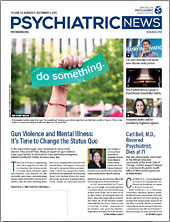Carl Bell, M.D., a towering figure in American community psychiatry, died suddenly on August 2. He was 71 years old.
Bell’s influence—as a clinician, researcher, educator, mentor, public health advocate, and activist—was vast, broad, and deep. He was a pioneer in at least four major areas: research on the effects of early childhood trauma, especially in disadvantaged minority communities; the effects of fetal alcohol syndrome on later psychosocial development; violence prevention; and HIV prevention and treatment.
“Carl Bell was a leader, a teacher, and a mentor to more people than many knew, as well as an innovative researcher,” said APA CEO and Medical Director Saul Levin, M.D., M.P.A. “He was also a visionary who saw that social justice and mental health were connected. He always stood against injustice wherever it occurred. For that I was deeply appreciative.”
Among community psychiatrists, Bell was a luminary whose work on cultural, ethnic, and socioeconomic factors in mental illness was seminal.
“Carl Bell has been an icon of community mental health for the past 25 years,” wrote David Pollack, M.D., professor emeritus for public policy at Oregon Health Sciences University, in a 2006 review of Bell’s book, The Sanity of Survival: Reflections on Community Mental Health and Wellness, published in Psychiatric Services. Pollack called the work “a searing treatise on the impact of culture and racism in our society and our profession.” He added, “Bell’s primal and primary dedication to the African American community is the vehicle through which we all can learn and relearn the basic lesson that good clinical practice must seriously and comprehensively take cultural and ethnic factors into account.”
News of Bell’s death caused list serves and bulletin boards to light up with expressions of shock, sorrow, gratitude for his leadership and mentorship, and condolences for his surviving family. He touched countless people—young, striving physicians as well as senior psychiatrists who had achieved positions of leadership—all of whom testified to his good humor and compassion.
“Carl was a dear friend as well as a professional colleague,” immediate past APA President Altha Stewart, M.D., told Psychiatric News. “He was a brother to me in the familial sense that many in the black community share. We argued and we disagreed plenty of times, but we always came back together as friends. In that way, he was really like family in addition to being a respected professional colleague for over 40 years.”
She said she first met Bell at meetings of the Black Psychiatrists of America (BPA), a group that was formed in the late 1960s by psychiatrists frustrated with APA’s response to racism. “Carl was one of the first people I met at BPA,” she said. “Within BPA and within APA, we worked on many components and committees together and served on more panels where we spoke together than I can remember.”
Stewart said that within BPA, Bell helped to catalogue the organization’s newsletters, serving as an archivist and an advocate for compiling a record of the group’s activities. “He had a great attention to detail,” Stewart said. “He was a renaissance man in many ways—an historian, an academician, a researcher, and a clinician. He was committed to the mental health of black people, and he was committed to the next generation of clinicians, researchers, and teachers. He always had a minute to give you, whether it was to offer some comfort or to chastise you for not doing enough.”
The cause of Bell’s death is unknown. He died shortly after returning from Hawaii, where he attended the annual meeting of the National Medical Association (NMA) and addressed the convention in the session “Fetal Alcohol Syndrome in the African American Community.” At the meeting, Bell also received the NMA’s highest award, the Scroll of Merit Award, for lifelong contributions to medicine, psychiatry, and the African American community.
Rahn Bailey, M.D., APA’s minority/underrepresented trustee, attended the NMA meeting with Bell and said that he was in his usual good humor. “My heart is with the family of Carl Bell who is undoubtedly experiencing unimaginable loss,” Bailey said. “Carl was an outstanding African American man whose influence was far-reaching and extended far beyond the field of psychiatry. His passing is a loss to the African American community at large.
“He was a high-quality academician,” Bailey said. “His impressive body of work included over 400 peer-reviewed papers. Despite his many achievements, Carl remained humble while encouraging others to engage in academic pursuits. In 2012, it was a privilege to have him as a guest lecturer during psychiatric grand rounds at Meharry Medical College. I fondly recall how much of a motivational speaker he was. Indeed, many of the residents were inspired to participate in academic endeavors. It warmed my heart to see him personally receive the National Medical Association’s Scroll of Merit Award. His life and legacy have enriched us all.”
One of Bell’s signature themes was his advocacy for what he called “bent-nail research”—a phrase he coined to emphasize the need for clinicians, especially those in minority communities, to undertake their own research and draw on experience in their own communities without relying on big grants or elaborate study designs. He derived the phrase from his childhood on the South Side of Chicago; he wanted to be a carpenter, but the family couldn’t afford to buy tools and supplies. So, Bell scoured the streets and backlots for rusty and sometimes bent nails he could use for his building projects.
“What Carl meant was that you didn’t need a big, fancy lab to do important research,” Stewart said. “Carl’s best research started with an unanswered question or questions about a patient or a group of patients he wanted to know more about. He looked for ways to study that question and then he went about the business of studying it.”
Bell was passionately committed to the African American community of South Side Chicago. His own bent-nail research there helped to highlight the enormous public health effects of fetal alcohol syndrome, possibly his most important research contribution—or, certainly, the one for which he is best known. Interviews with mothers in the community convinced him that though many believed they had stopped drinking during their pregnancies, very frequently they had been drinking socially for weeks or even months before they knew they were pregnant.
In a chapter in a National Academy of Medicine report, “Perspectives on Health Equity and Social Determinants of Health,” Bell drew attention to the problem of fetal alcohol syndrome and urged widespread use of supplementary choline for pregnant women. He cited the work of Robert Freedman, M.D., immediate past editor of The American Journal of Psychiatry, and colleagues showing that prenatal dietary supplementation with choline—by increasing activation of the α7-nicotinic acetylcholine receptor—may alter the development of behavioral problems in early childhood.
In comments to Psychiatric News, Freedman called Bell a pioneering leader in adolescent psychiatry who devotedly served his Chicago community. “He was particularly effective in bringing treatment to adolescents in poorer areas in Chicago, whom he recognized as disadvantaged from birth,” Freedman said. “Throughout his career until his death he continued to provide psychiatric care himself. He was a tireless advocate nationally for improving conditions in pregnancy. He correctly viewed the maternal use of alcohol and marijuana in pregnancy as the first blows to the children whom he would later work so hard to treat.”
As broad as Bell’s influence is among contemporary psychiatrists, his largest footprint may be on the future. He inspired countless young minority physicians to reach for the stars. “Carl Bell encouraged psychiatrists to reject the status quo,” said Danielle Hairston, M.D., president of the APA Caucus of Black Psychiatrists. “He led by example, demonstrating that through scholarship, you can combat racial discrimination. Through his research, writing, and evidence-based medicine, he pushed us all to fight for just treatment and health equity for persons traumatized in the black community. He encouraged physicians to engage in ‘bent-nail research’—to conduct their own empirical research in the communities where they work with limited resources and without formalities."
Hairston added, “He had a great sense of humor and could always make you laugh, even in the face of adversity.” ■

